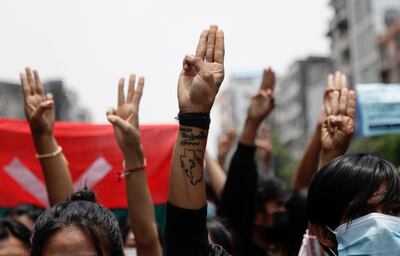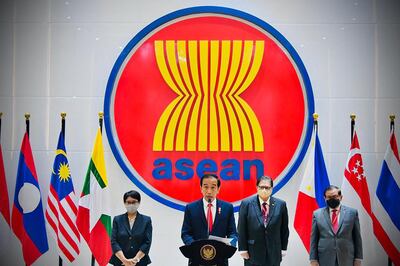The credibility of the Association of South-East Asian Nations (Asean) was at stake in the run-up to what was widely billed as an emergency summit on Myanmar over the weekend. The international community reacted with condemnation and sanctions to the military coup that displaced the country's democratically elected government in February, but thus far nothing has even stalled the junta's jailing of critics and campaign of repression and killing.
If Asean "centrality" – the notion that Asean should be the driving force or at least pivotal to any discussions or actions in the region – was to mean anything at all, the 10-member group Myanmar has been part of since 1997, had to take some kind of stand. With the coup leader, Senior General Min Aung Hlaing, present at talks in Jakarta, would Asean pass the test? Or would it reveal itself to be truly "Nato" – no action, talk only – toothless in the face of a member state potentially descending into civil war or even on the way to becoming a failed state?
In the event, a “Five-Point Consensus” was reached and issued in the name of the current Asean chairman, the Sultan of Brunei. It called for an immediate cessation of violence with all parties exercising utmost restraint; constructive dialogue among all parties to seek a peaceful solution; a special envoy of the Asean Chair to mediate the dialogue process, with the assistance of the Secretary General of Asean; Asean to provide humanitarian assistance; and the special envoy and delegation to visit Myanmar to meet all parties concerned.

By Asean's standards, this was pretty forceful. And it was greeted with approval by the ousted parliamentarians of Aung San Suu Kyi's National League for Democracy and other forces opposed to the junta in Myanmar. The consensus was "encouraging", said Dr Sasa, the international co-operation minister of the parallel National Unity Government. "We look forward to firm action by Asean to follow up its decisions and to restore our democracy and freedom."
If this was an achievement, it was a very Asean-esque achievement: a step forward that still allowed all parties to maintain face. To start with, it was not an “Asean summit”, which are official gatherings held twice a year by the chair country. No, this was a less high-level “Leaders’ Meeting”. Neither was it initiated to address the crisis in Myanmar, or not nominally so according to the chair’s statement. That said, the meeting “was convened with the view to advance Asean Community building, hasten recovery from the Coronavirus Disease 2019 [Covid-19] pandemic, strengthen Asean’s external relations and address pressing issues of common interest to all Asean Member States". The situation in Myanmar was only recognised near the end of the 1,000-word statement.
Nor did Mr Min Aung Hlaing – or MAH, an abbreviation increasingly being used – formally agree with the Five-Point Consensus. He just didn’t disagree. He “did not reject what was put forward by me and many other colleagues", was how Malaysian Prime Minister Muhyiddin Yassin put it. MAH spoke last at the meeting, after all the other participants, and “said he heard us, he would take the point in, which he considered helpful", as Singapore Prime Minister Lee Hsien Loong characterised the military leader’s response.
I'm told the meeting was expected to last two to three hours but went on longer, not least as the continental mainland countries present – Thailand, Vietnam, Laos and Cambodia – were "deeply ambivalent" about its purpose. None of the latter three are functioning democracies. In the case of Thailand, MAH not only has a close friend in its leader Prayuth Chan-ocha, a former general who first came to power as a result of a coup in 2014, but MAH was also "adopted" in 2012 as a kind of godson by possibly the most influential man in the country after the king, the late Prem Tinsulanonda, a former premier, army chief and president of the Privy Council.
No wonder the word is that MAH felt no need to be defensive. Nevertheless, he will have understood the point made by Malaysia's Mr Muhyiddin, who said: “Many around the world want an explanation, and we are finding it increasingly tough to explain. The international community expects Asean to act and address what is happening in our very own backyard.”
With the force of this statement, the meeting was able to accept the five points, which I understand Brunei and Indonesia (where the Asean Secretariat is headquartered) played a key role in formulating after consultation with the member states.
There was a last-minute change to the consensus – a demand for all political prisoners to be freed was removed, and turned up instead in the chairman’s statement as “we also heard calls for the release of all political prisoners including foreigners".
While Singapore’s Mr Lee warned at the meeting of a “humanitarian disaster” unfolding in Myanmar, MAH will have been pleased to hear him say: “Any solution that returns Myanmar to the path of democratic transition must involve both the Tatmadaw [the armed forces], which has always been a key institution in Myanmar's body politic, and also the National League for Democracy, which commands popular support.”
That will infuriate implacable opponents of the armed forces such as the activist Dr Maung Zarni, who considers the Tatmadaw to be an “existential threat” to the country, but Mr Lee was echoing a view deemed to be unpalatable but realistic almost universally in the region.
Likewise most will concur with Malaysia’s Mr Muhyiddin when he told a news conference on Saturday: “We have succeeded. It’s beyond our expectation in getting the outcome from today’s meeting.” Given Asean’s composition and its stress on “non-interference” in each others’ affairs, the group really did as much as could reasonably be expected.
Euan Graham, a Singapore-based analyst, recently wrote that “Asean centrality is the hole in the doughnut. Integral to the design, but not the most filling part". But if Asean wastes no time in acting on its statements after the Jakarta meeting, with the swift appointment of a special envoy and concrete moves on the ground, it will have proved that its “centrality” is not just a void, as per Mr Graham’s amusing description, but something tangible and consequential. Asean passes the test. For now.
Sholto Byrnes is an East Asian affairs columnist for The National























